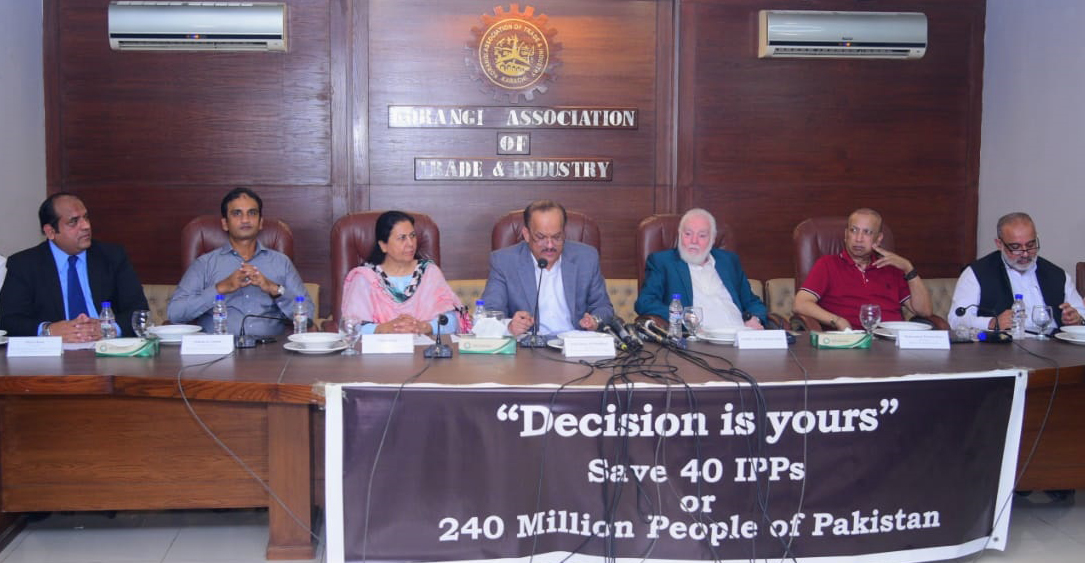Electricity Price Should Be Set at 9 Cents Per Unit, Electricity Market Should Be Established: President KATI:
KARACHI: President of Korangi Association of Trade and Industry (KATI), Johar Qandhari, has raised a clarion call for economic reform during an emergency press conference. He demanded that the price of electricity be set at 9 cents per unit, criticizing the exorbitant payments to Independent Power Producers (IPPs).
Qandhari stated, “The IPPs are receiving more money than Pakistan’s defense budget.” He emphasized that the interests of the 240 million people of Pakistan should take precedence over the interests of the 40 families running these IPPs. Present at the conference were notable figures including Senator Abdul Haseeb Khan, Senior Vice President Nighat Awan, Standing Committee Chairman Danish Khan, Rehan Javed, Former Presidents Saleem-uz-Zaman, Sheikh Fazal-e-Jalil, Ehtashamuddin, Razi Ahsan and other leading industrialists and journalists.
Qandhari called for the cancellation of contracts with unnecessary private companies and a forensic audit of the IPPs. He questioned, “Do we prioritize the interests of 40 IPP-running families, or do we care more for the 240 million citizens?” He lamented that the economic policies so far have favored the former, leading to the neglect of the vast majority.
He highlighted that while the total production capacity of electricity installed is 45,000 megawatts, only 22,000 megawatts are being utilized. He pointed out that the cost of a unit of electricity for consumers, without tax, is Rs. 35, which rises to Rs. 60 after tax. Out of the Rs. 35, Rs. 18 per unit is paid in capacity charges for electricity not even used, pushing the economy towards destruction.
Qandhari detailed that Rs. 2,000 billion will be paid in capacity charges, putting severe pressure on the economy. He proposed changes to the capacity conditions of government-owned IPPs, which account for 45% of the market, including reducing management costs and shifting from LIBOR of London Market to KIBOR for payments. He also suggested renegotiating contracts with privately-owned IPPs, which make up 25% of the market, to shift from “Take or Pay” to “Take and Pay” agreements.
He urged the government to persuade China to negotiate debt restructuring and extend repayment periods for IPPs under CPEC. He also emphasized the need to expand transmission lines to utilize surplus electricity fully and to use resources for generating cheap electricity.
Qandhari advocated for the establishment of an electricity market in Pakistan, suggesting that the government step back from electricity production and purchase, and entrust these to private companies to foster competition. Consumers should have the option to choose their electricity provider, allowing them to select companies offering better terms and cheaper rates.
He also urged the government to halt new IPP projects and improve capacity through negotiations with existing IPPs. Lowering the electricity price from 16.5 cents to 9 cents would reduce costs for domestic consumers and industries, lowering production costs, reducing inflation, boosting exports, decreasing circular debt, and reducing import dependence, ultimately driving Pakistan’s economic growth.
Senator Abdul Haseeb Khan, Standing Committee Chairman Danish Khan, and Rehan Javed echoed Qandhari’s sentiments, calling for Federal Minister for Energy Sardar Owais Laghari to examine IPP contracts under government supervision. They demanded that IPP contracts be made public and audited by international companies.

